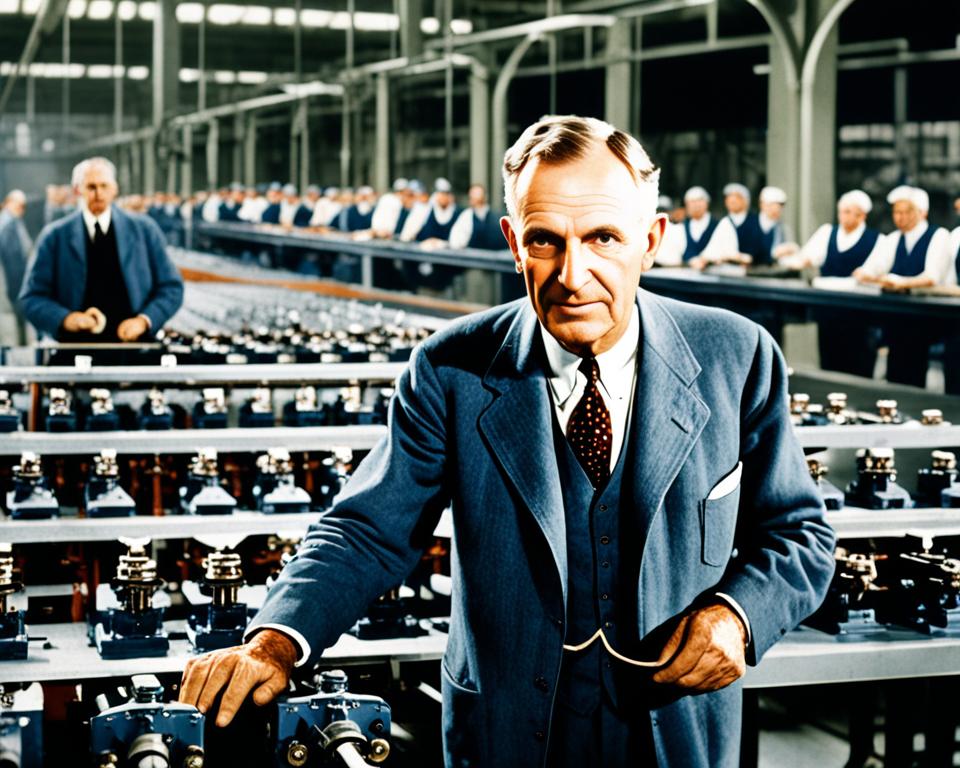Henry Ford, the founder of Ford Motor Company, was a pioneer in the business world, revolutionizing modern industry with his innovative leadership techniques. His leadership style, characterized by Fordism principles and innovative techniques, has had a profound impact on the automotive industry and beyond.
Fordism, a concept introduced by Henry Ford, focuses on the combination of mass production of inexpensive goods with high wages for workers. This approach revolutionized manufacturing, making automobiles accessible to the masses while also ensuring the well-being of his employees.
Henry Ford believed in the importance of happy employees, recognizing that satisfied workers would be more productive. To achieve this, he implemented strategies such as the $5 day and reduced work hours. These measures not only improved employee satisfaction but also boosted productivity and efficiency.
His leadership style went beyond traditional management practices. Ford valued human capital and believed that every individual should be treated with respect and equality. This emphasis on valuing employees and promoting equality set a new standard for the business world.
Henry Ford also displayed a high level of emotional intelligence, understanding the needs and perspectives of both his employees and customers. This enabled him to make informed decisions and drive the success of the Ford Motor Company.
Throughout his career, Henry Ford demonstrated that innovative leadership techniques, such as Fordism principles, valuing human capital, promoting equality, and being emotionally intelligent, can lead to significant achievements and long-lasting success.
Key Takeaways:
- Henry Ford revolutionized the business world with his innovative leadership techniques.
- Fordism principles combined mass production and high wages for workers.
- Henry Ford believed in valuing human capital and promoting equality.
- His leadership style emphasized the importance of employee satisfaction and productivity.
- Emotional intelligence played a key role in Henry Ford’s decision-making process.
Table of Contents
The Impact of Ford’s Leadership Style
Henry Ford’s leadership style had a profound impact on the business world, leaving behind a lasting legacy. His unwavering commitment to valuing employees and providing fair wages revolutionized the way companies operated.
By prioritizing employee well-being, Ford fostered a culture of loyalty, dedication, and increased productivity within his company. His success in implementing the $5 day wage and reducing work hours not only set a new standard for fair compensation but also demonstrated the positive effects of valuing human capital.
Furthermore, Ford’s leadership style set a benchmark for workplace equality and inclusion. At a time when discrimination and inequality were prevalent, Ford championed diversity by hiring African American workers and promoting women to managerial positions. His dedication to equality created a more inclusive and progressive work environment.
One of Ford’s key strengths as a leader was his emotional intelligence. He understood the importance of empathizing with both customers and employees, which fueled his ability to innovate and meet their needs. By actively listening to feedback and understanding consumer desires, Ford Motor Company thrived in delivering quality products that resonated with buyers.
The success factors of Ford’s leadership style included not only his unwavering commitment to valuing human capital and promoting equality but also his emotional intelligence and ability to understand the needs of others. These factors played a pivotal role in the long-standing success of the Ford Motor Company.
| Impact of Ford’s Leadership Style | Success Factors |
|---|---|
| Revolutionized the business world | Valuing human capital |
| Fostered loyalty and increased productivity | Promoting workplace equality |
| Pioneered fair wages and reduced work hours | Emotional intelligence |
| Promoted diversity and inclusion | Understanding customer and employee needs |
Ford’s Leadership Qualities
In order to understand the success of Henry Ford as a leader, it is essential to examine the key qualities that he possessed. Ford’s management strategies and conviction-based leadership approach set him apart from his contemporaries and contributed to his lasting legacy.
Valuing Human Capital
Henry Ford believed in the importance of valuing his employees and recognizing their worth. He understood that motivated and satisfied workers would lead to increased productivity and success for the company. To achieve this, Ford implemented fair wages and reasonable working hours, pioneering the introduction of the $5 day and shorter shifts. This approach not only improved employee satisfaction but also ensured loyalty and dedication to the company.
Conviction-Based Leadership
One of the defining qualities of Henry Ford’s leadership style was his commitment to his vision. He led with conviction and unwavering belief in the future of his company. This allowed him to make bold decisions, take risks, and push boundaries. Ford’s conviction-based leadership approach inspired his team and propelled the success of the Ford Motor Company.
Cost-Cutting and Efficient Production
Ford revolutionized the manufacturing industry with his management strategies focused on cost-cutting and efficient production methods. He introduced the assembly line, significantly speeding up the production process and reducing costs. This innovation allowed Ford to produce vehicles at a much higher volume and lower price, making automobiles accessible to the masses. His emphasis on efficiency and cost management set the stage for the modern manufacturing practices that are still followed today.
Henry Ford’s leadership qualities encompassed valuing human capital, conviction-based leadership, and a focus on cost-cutting and efficiency. These principles formed the foundation of his success and continue to influence leaders in the present day. Ford’s ability to motivate and retain employees, combined with his visionary approach and innovative strategies, established him as one of the most influential leaders in history.
Henry Ford Compared to Other Entrepreneurs
When comparing Henry Ford to other entrepreneurs, such as Richard Branson, Bill Gates, and William C Durant, it is clear that Ford possessed unique qualities that set him apart.
Unlike Durant, Ford was a risk-taker and innovator, venturing into new industries and revolutionizing production methods.
Ford’s belief in equality and diversity also distinguished him from other entrepreneurs like Branson and Gates.
While Branson and Gates made significant contributions to their respective industries, Ford’s impact on the automotive industry and his leadership qualities make him a standout entrepreneur.
Let’s take a closer look at the key attributes that differentiate Henry Ford from these notable entrepreneurs:
- Risk-Taker and Innovator: Ford was known for his boldness in exploring new ideas and pushing boundaries, while others may have been more cautious in their approaches.
- Revolutionizing Production Methods: Ford’s introduction of the assembly line and mass production techniques transformed the manufacturing industry, setting him apart from his contemporaries.
- Belief in Equality: Ford’s emphasis on providing fair wages and valuing all employees, regardless of their position, reflected his commitment to equality, whereas some other entrepreneurs may not have prioritized this aspect.
- Impact on the Automotive Industry: Ford’s pioneering automobile designs and the success of Ford Motor Company had a profound influence on the automotive industry, establishing him as a visionary in his field.
Henry Ford’s unique qualities and contributions to the business world set him apart from other prominent entrepreneurs. His risk-taking nature, innovative mindset, commitment to equality, and transformative impact on the automotive industry solidify his position as an exceptional leader and visionary.
Hofstede’s Cultural Dimensions and Ford’s Leadership Style
In examining the leadership style of Henry Ford, it becomes apparent that there is a correlation with Hofstede’s cultural dimensions. Ford’s emphasis on equality and inclusion reflects a low power/distance (PD) cultural dimension. He fostered a flat organizational structure and treated employees equally, regardless of their position. This approach created a sense of unity and collaboration within the company.
Ford’s leadership style also aligns with the individualism (IDV) cultural dimension. He believed in individual consideration and valued the contributions of each worker. Ford’s appreciation for his employees and his belief in the power of the individual were central to his leadership philosophy.
Furthermore, Ford’s leadership style exhibits aspects of the masculinity (MAS) and uncertainty avoidance (UA) cultural dimensions. His emotionally intelligent approach and understanding of others’ perspectives reflect the importance of considering diverse viewpoints in decision-making. By embracing change and adapting to uncertain situations, Ford was able to drive the success of his company.
While there is a clear association between Ford’s leadership style and Hofstede’s cultural dimensions, further research is needed to fully analyze the relationship. Nonetheless, it is evident that Ford’s leadership approach resonates with the principles outlined in Hofstede’s framework.
Summary:
- Ford’s emphasis on equality and inclusion aligns with a low power/distance (PD) cultural dimension.
- His focus on individual consideration and appreciation of workers reflects the individualism (IDV) cultural dimension.
- Ford’s emotionally intelligent approach and adaptability align with the masculinity (MAS) and uncertainty avoidance (UA) cultural dimensions.
- Further research is needed to fully analyze the relationship between Ford’s leadership style and Hofstede’s cultural dimensions.
Conclusion
Henry Ford’s leadership style revolutionized the business world and continues to leave a lasting legacy today. His visionary approach, focused on valuing human capital, promoting equality, and being emotionally intelligent, set him apart as a remarkable leader. Ford’s innovative production methods, such as the introduction of the assembly line, redefined efficiency in the automotive industry.
His conviction-based decision-making and unwavering vision drove the success of the Ford Motor Company. Henry Ford’s impact on the business landscape cannot be underestimated. His influential leadership qualities continue to inspire and guide leaders in the modern era, serving as a testament to his enduring legacy.
Whether it was through his $5 day wage and reduced work hours for employees, his commitment to equality, or his understanding of customer and employee needs, Henry Ford left an indelible mark on the realm of leadership. Today, leaders can draw inspiration from Ford’s values and principles, striving to create positive and inclusive work environments that prioritize the well-being of their employees while driving innovation and success.


